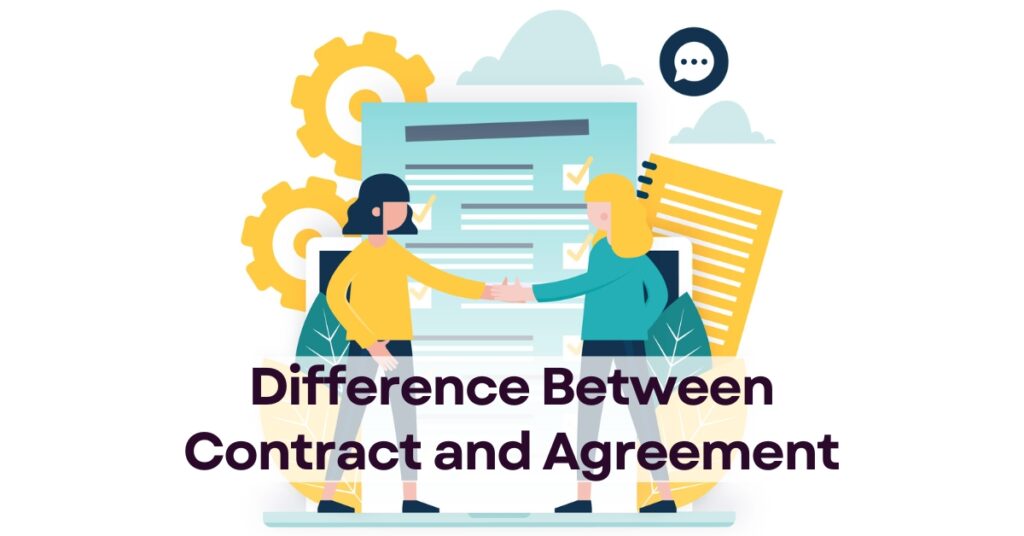Table of Contents
For people who are not acquainted with the law, the terms agreement and contract are often used interchangeably. However, they are not the same. Understanding the difference between agreement and contract is crucial, especially when entering legal relationships. Whether you’re forming a partnership, hiring services, or sealing a business deal, knowing when and how to use an agreement or contract can save you from future disputes.
What is an Agreement?
An agreement is a mutual understanding between two or more parties about their rights and responsibilities. It can be written or verbal and does not necessarily have to be legally binding.
For instance, if you and a friend agree to start a business together, that mutual consent is an agreement even if it’s not legally enforceable.
Types of Agreement
- Social Agreement: Informal and non-enforceable, such as meeting a friend for dinner.
- Commercial Agreement: Business-related, but may not meet all legal requirements to be enforceable.
- Void Agreement: An agreement that is not legally enforceable (e.g., an agreement made with a minor or for an illegal purpose).
What is a Contract?
A contract is a legally enforceable agreement, which means that until and unless an agreement is approved by law, it cannot become a contract. For an agreement to become a contract, it must have elements such as offer, acceptance, consideration, a legal object, and competent parties.
Types of Contract
- Valid Contract: Meets all legal requirements and is enforceable.
- Void Contract: Initially valid but becomes unenforceable due to certain circumstances (e.g., impossibility of performance).
- Voidable Contract: Enforceable by law at the option of one or more parties. It means that initially it is valid, but later it can be terminated by one or more parties to the contract.
- Unilateral and Bilateral Contracts: Based on the number of parties involved in the performance.
- Express and Implied Contracts: Based on how they are formed (written/spoken vs. conduct). If the contract is in writing or oral, it is an expressed contract and if formed by ways of conduct, it is implied.
What is the Difference Between Contract and Agreement?
Understanding the difference between contract and agreement can help you decide which document is appropriate for your situation. Below is a comparison table for clarity:
| AGREEMENT | CONTRACT |
| Based on mutual understanding between the parties. | Legally enforceable agreement. |
| Not necessarily enforceable by law | Always enforceable if valid |
| Essentials are offer and acceptance | Essentials include offer, acceptance, consideration, legality, etc. |
| It has a wider scope (includes social agreements) | It has a narrower scope (only legal agreements) |
| May be void | Can be valid, void, or voidable |
Difference between Void Agreement and Void Contract
While both are unenforceable, their nature and origin differ:
- A void agreement is never legally enforceable from the beginning. For example, an agreement made for illegal purposes, such as if Ram agrees to provide Shyam with weed, is a void agreement.
- A void contract was initially valid but later became unenforceable due to unforeseen circumstances like a change in law or impossibility of performance. For example, a contractor couldn’t supply the goods to the buyer due to war; here, the contract becomes void as it becomes impossible to perform.
When to Use an Agreement vs Contract?
- Use an Agreement when you are creating a mutual understanding that may not need legal backing, like a non-binding memorandum or informal partnership terms.
- Use a Contract when you need legal protection, like employment terms, service agreements, or purchase deals.
Knowing this distinction helps you manage expectations and ensures legal security when required.
How eDrafter Can Help You Draft an Agreement or Contract?
At eDrafter, we specialise in creating legally sound and customised agreements and contracts to suit your unique needs. Our team of legal experts ensures that every document meets the necessary legal criteria. Whether it’s a simple agreement between two parties or a complex business contract, we take care of the drafting, stamping, and even e-signing, making your legal journey hassle-free.
Why Choose eDrafter?
- Legal expertise and consultation
- Professionally drafted legal documents
- Quick turnaround time
- Stamp paper procurement
- Digital signing and delivery
- Affordable pricing
Conclusion
Understanding the difference between a contract and agreement is essential in both personal and professional settings. While all contracts are agreements, not all agreements qualify as contracts. The key lies in legal enforceability and the presence of essential elements. Whether you need a simple agreement or a comprehensive contract, platforms like eDrafter make it easier and legally safe.
Frequently Asked Questions
Is signing an agreement the same as a contract?
Not always. An agreement becomes a contract only when it meets legal enforceability criteria.
Is an agreement enforceable by law?
Only if it fulfils the requirements of a valid contract under applicable laws.
When does an agreement become a contract?
An agreement becomes a contract when it has an offer, acceptance, consideration, a lawful object, and is between competent parties.
What is the validity of an agreement?
An agreement is valid if it meets the terms mutually decided by the parties, but it becomes legally valid only when it turns into a contract.
Is agreement valid without a lawyer?
Yes, an agreement can be valid without a lawyer, but professional legal drafting ensures clarity and legal compliance.


